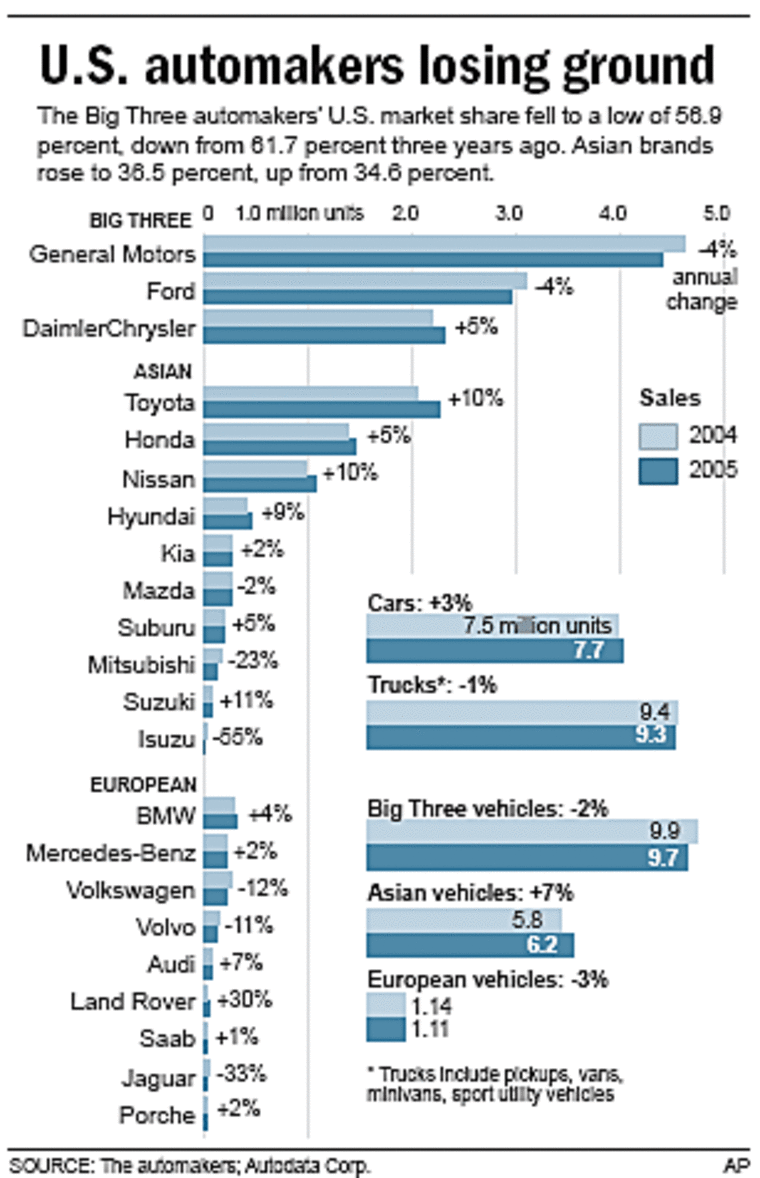U.S. automakers posted lower December sales Wednesday, capping a tumultuous year in which Detroit’s Big Three struggled to come to terms with changing consumer tastes and high gas prices.
In sharp contrast, Toyota Motor Corp. -- which may soon unseat GM as the world’s largest automaker -- posted a 8.2 percent increase in December sales and likely grabbed more market share from U.S. automakers last month.
General Motors Corp. and Ford Motor Co., both facing a deepening financial crisis, said December sales were down 10.2 percent and 8.7 percent, respectively, with steep declines in SUV sales.
DaimlerChrysler AG said its U.S. sales fell 2 percent last month, with sales at its Chrysler division falling 5 percent.
Given “volatile gas prices” overall auto sales this year are likely to be lower than in 2005, Mark Fields, president of Ford’s operations in the Americas, told reporters at the Los Angeles Auto Show Wednesday.
Also, KPMG LLP released a survey that showed most auto industry executives believe U.S. automakers share of global market will decline in the next 5 years.
Asian brands won a 36.5 percent share of the U.S. market through November of last year, a 1.9 percentage point increase compared with the same period a year ago. U.S. automakers, on the other hand, lost 1.7 points of share, according to industry tracking firm Autodata.
Down for the year
Nissan Motor Co. Ltd. said it U.S. sales slipped 1 percent even as sales for the full year finished 9.6 percent higher.
Overall, GM sales declined 4 percent in 2005, while Ford sales were down 4.4 percent.
In a bright spot for Detroit, Chrysler Group said sales rose 5 percent for the year.

GM, Ford and Chrysler saw sales soar this summer with employee discount programs, where they offered the public new vehicles at the same low prices their employees pay. But sales fell in the following months.
The biggest trend in 2005 was a shift toward cars and away from fuel-thirsty SUVs, analysts said.
Both GM and Ford have relied on mid- and full-sized SUVs as profit engines since the late 1990s. But those vehicles, especially from the aging lineups offered by GM and Ford, proved less attractive as gas prices hovered at near-record highs throughout 2005.
Sales of GM’s largest SUVs such as the Suburban fell 36 percent in December and were down 27 percent for the year. Sales of Ford’s Explorer SUV fell 24 percent last month and 29 percent for the full year.
Ford said sales for its cars rose 2 percent last year, its first car sales increase since 1999. Combined sales for the new Ford Fusion, Mercury Milan and Lincoln Zephyr sedans in December were 11,808, up 33 percent from November. The cars were introduced in October.
“If our market share in this category holds up, it would be the first year since 1993 that we have achieved an increase in car market share,” Ford’s chief sales analyst George Pipas said.
Overall, analysts are forecasting December sales for the industry will drop to a seasonally adjusted annual rate in the range of 16.7 million to 17.2 million vehicles, lower than the 17.9 million rate a year ago, but higher than the 15.7 million rate last month.